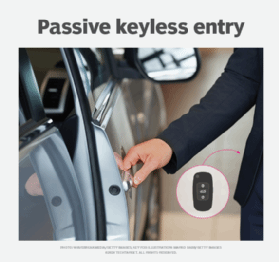What is passive keyless entry (PKE)?
Passive keyless entry (PKE) is an automotive security system that operates automatically when the user is in proximity to the vehicle, unlocking the door on approach or when the door handle is pulled, and locking it when the user walks away or touches the car on exit.
PKE systems are also used to secure buildings or areas of buildings. This technology is designed for convenience and security, eliminating the need for manual key usage.
A PKE device can operate while stored in the user's pocket or bag, unlike a standard remote keyless entry, or RKE, device, which requires the user to hold the device and push a button to lock or unlock the vehicle. This hands-free approach enhances user convenience, especially when the user is carrying items or in a hurry.
What are the components of PKE?
Passive keyless entry systems typically involve a radio frequency key fob, but there are also smart cards and mobile apps designed for PKE.
The PKE key fob and the vehicle module both contain transceivers that communicate wirelessly to detect each other. The module in the vehicle continually sends out encoded messages; when the key fob is in range, it responds. If the encrypted messages are correct, they identify the vehicle and key fob to each other, and the door unlocks.

This secure communication process helps prevent unauthorized access, making PKE systems a robust option for modern vehicles.
Current PKE systems often use rolling codes to ensure a fresh code is supplied each time, preventing the possibility of a replay attack. Rolling codes add an extra layer of security by changing the code with each interaction, making it nearly impossible for hackers to use intercepted signals to gain access.
Cars that are designed for passive keyless entry often feature keyless start as well, which simply requires the driver to push a button. That combination is sometimes called passive entry passive start, or PEPS. This system not only enhances security, but also adds to the seamless driving experience.
Passive keyless entry differences across manufacturers
Individual smart keys can be customized for specific drivers, adjusting seat and mirror positions automatically, for example, or setting the car's radio to the driver's chosen station. Customization options make PKE systems more personalized and convenient for users.
Siemens, a German manufacturing and electronics company, developed the first PKE system in the mid-1990s, and Mercedes-Benz implemented it under the name Keyless Go. Since then, PKE systems have become standard in many modern vehicles, with each manufacturer offering its unique branding and additional features. There are a great number of other names for PKE systems, and they vary from one manufacturer to another.
Advanced PKE security features
Modern PKE systems have evolved to include advanced security features that go beyond rolling codes. Some systems now integrate biometric verification, such as fingerprint or facial recognition, to further secure vehicle access. These enhancements are designed to prevent unauthorized access, even if the key fob is compromised.
Integration with smart devices
Another recent development in PKE systems is the integration with smartphones and wearable devices. Drivers can now use mobile apps to unlock their vehicles, start the engine and perform other functions remotely.
This integration enhances the convenience and utility of PKE systems, particularly in connected car environments where smart technology is increasingly prevalent.
Increased PKE adoption in various market segments
Initially introduced in luxury vehicles, PKE systems have seen widespread adoption across various market segments, including midrange vehicles. This broader adoption is driven by the increasing demand for convenience and security features across different car models.
As the technology has matured, the cost of PKE systems has decreased, making them more accessible to a wider range of consumers.
Passive key entry market growth and trends
The global market for PKE systems is expected to grow significantly in the coming years, driven by the rising demand for advanced vehicle security features as well as the adoption of electric and autonomous vehicles.
Valued at $12.7 billion in 2023, the automotive smart key market is expected to grow at a compound annual growth rate of more than 9.1% between 2024 and 2031. At that time, industry analysts estimate that the value of the market segment will reach $117 billion.
This growth is also influenced by regulatory policies that emphasize vehicle safety and the increasing penetration of luxury cars in emerging markets like the Asia-Pacific region.
Self-driving cars are complex and contain many interconnected systems. Learn how AI assists in driving for autonomous vehicles.
